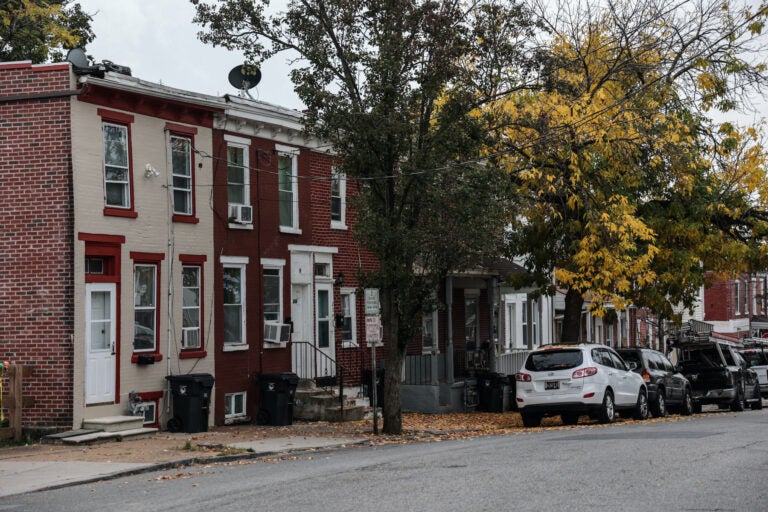Delaware state lawmakers hold second hearing into once-in-40-year property reassessments
Kent and Sussex counties received praise for clear communication, while New Castle County was criticized for a lack of transparency.
Listen 1:03
A line of rowhouses in Wilmington, Delaware. (Kimberly Paynter/WHYY)
What are journalists missing from the state of Delaware? What would you most like WHYY News to cover? Let us know.
Some Delaware lawmakers say they’re concerned that Tyler Technologies — the appraisal company that conducted the state’s recent property reassessments — controls algorithms and data used to determine property values in two of the state’s three counties.
Kent and Sussex counties presented Tuesday at the second hearing of a special legislative committee examining the recent once-in-40-year property assessments and exploring possible fixes for the next round of reassessments. The committee also heard from the International Association of Assessing Officers and the Lincoln Institute of Land Policy, which study fair and efficient taxation methods.
Kent completed its reassessments in 2024, ahead of Sussex and New Castle counties.
Representatives from Kent and Sussex said Tyler Technologies, not the counties themselves, control the calculations of their property reassessments. Both counties use Tyler’s software for some administrative functions, paying the company on an annual or quarterly basis.
State Sen. Dan Cruce, D-Wilmington, said he was also concerned that Tyler’s agreements could position the company to be chosen again as the contractor for property reassessments, but at a higher cost.
“I want us to pay attention to what sounds like an initial, very low-ball bid, and then technology now in our counties that’s likely hard to extract or start over should another vendor be chosen in the future,” he said. “And then initial due diligence sounding like the price could be a lot higher.”
Homeowners throughout the state face county and school taxes increases, in some cases up to thousands of dollars, after property values were reassessed for the first time in decades.
Much of the tax burden in New Castle County shifted from commercial properties to residential homes. New Castle County Executive Marcus Henry said earlier this month that the average residential assessments in New Castle County rose by 477%, while the average nonresidential evaluations went up 233%.
The shift was not as pronounced in Sussex County, where homes went from 84% to 88% of the tax base, while commercial properties went from 10% to 8%. Sussex County’s 2023 reassessments was its first since 1974.
Tyler has maintained that its methodology meets industry standards. Information from the International Association of Assessing Officers appeared to support the City of Wilmington’s argument that certain parts of the city failed to meet equity standards for price-related differentials and bias. The poorest areas of the city are seeing the highest tax increases.
The IAAO representative also noted that it’s common for certain zones to be out of compliance while the entire area as a whole meets ratio standards.
Public outcry mounted in New Castle County over the tax spikes prompted state lawmakers to pass limited legislative fixes and hold hearings. The process has gone more smoothly in the two downstate counties.
Kent and Sussex counties say transparency was key
Kent County Administrator Kevin Sipple said they re-evaluated challenged data and made adjustments as needed. The county also expanded public outreach through townhalls, mailers, a website and phone services.
“Transparency was not a slogan,” he said. “It was a continuous commitment during this entire process, through our staff, the results.”
“It’s clear that transparency and consistent communication were priorities for Kent and Sussex counties throughout their reassessment processes,” said Rep. Kim Williams, D-Stanton.
“Unfortunately, New Castle County skipped this step and did not engage with stakeholders such as New Castle County legislators, school districts and, most importantly, our constituents,” she said.
The first legislative hearing last week focused on New Castle County’s decision to send out tentative assessed value notices in November 2024 instead of during the summer. State lawmakers questioned why New Castle did not send out tentative property value notices until mid-November 2024. Now-Gov. Matt Meyer, the previous county executive, was running for governor in last year’s election.
Henry, the New Castle County Executive, said it was his team’s understanding that the county’s assessment staff recommended several times that tentative value notices go out in the summer of 2024, but Meyer’s administration said no to those recommendations.
“Instead, the assessment office was advised that tentative value notices couldn’t go out until mid-November,” he said. “Accordingly, in mid-November 2024, Tyler mailed those notices of tentative value to property owners.”
But Sussex County officials also sent out notices in mid-November 2024. They said at Tuesday’s hearing that they were on the same timeline as New Castle and had similar types of properties.
“We signed the contract in 2021,” Sussex County Finance Director Gina Jennings said. “That date was always November. Obviously, we got a year extension, but when we extended, it was still November of 2024.”
The Lincoln Institute of Land Policy discussed the pros and cons of several options states have used to provide property tax relief, including homestead exemptions, property tax deferrals and assessment caps.
___
Editor’s note: This story has been updated to clarify the recommendations offered to lawmakers by the Lincoln Institute of Land Policy.
This story was supported by a statehouse coverage grant from the Corporation for Public Broadcasting.
WHYY is your source for fact-based, in-depth journalism and information. As a nonprofit organization, we rely on financial support from readers like you. Please give today.







